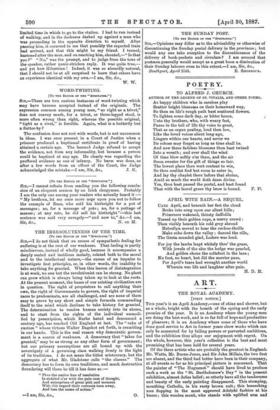THE IRRESOLUTENESS OF THE TIME.
[TO TRY EDITOR OE TEE SPECTATOR:1
do not think that an excess of sympathetic feeling for suffering is at the root of our weakness. That feeling is partly mischievous, instead of wholly good, because it accompanies a deeply seated and insidious malady, related both to the moral and to the intellectual nature,—the excess of an impulse to investigate that principles, or, in other words, the inability to take anything for granted. When this leaven of disintegration is at work, no one but the revolutionist can be strong. No plant can grow which is always being taken up to look at the roots. At the present moment, the bases of our existing civilisation are in question. The right of proprietors to call anything their own, the right of Governments to govern, the right of imperial races to predominate, are all challenged, and are none of them easy to prove by any short and simple formula commending itself to the mind which declines to take history for granted, The determination to resolve human society into its atoms, and to start from the rights of the individual nnmodi. fled by prescription, which Burke hated and denounced a century ago, has reached Old England at last. The "cake of custom" whose virtues Walter Bagehot set forth, is crumbling in our hands. This is the real reason why democratic govern- ment is a source of weakness. A democracy that "takes for granted," may be as strong as any other form of government ; but our primary assumptions are all bound up with the sovereignty of a governing class walking firmly in the light of its traditions. I do not mean the titled aristocracy, but the aggregate of what Mr. Gladstone calls "the classes." The democracy has to form its own traditions, and much destructive floundering will there be till it has done so Thus the native hue of resolution Is sicklied o'er with the pale cast of thought, And enterprises of great pith and moment With this regard their currents turn away, And lose the name of action."


































 Previous page
Previous page